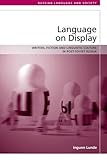Language on Display : Writers, Fiction and Linguistic Culture in Post-Soviet Russia / Ingunn Lunde.
Material type: TextSeries: Russian Language and Society : RLSPublisher: Edinburgh : Edinburgh University Press, [2022]Copyright date: ©2017Description: 1 online resource (232 p.) : 2 B/W illustrationsContent type:
TextSeries: Russian Language and Society : RLSPublisher: Edinburgh : Edinburgh University Press, [2022]Copyright date: ©2017Description: 1 online resource (232 p.) : 2 B/W illustrationsContent type: - 9781474421560
- 9781474421577
- 306.440947
- online - DeGruyter
| Item type | Current library | Call number | URL | Status | Notes | Barcode | |
|---|---|---|---|---|---|---|---|
 eBook
eBook
|
Biblioteca "Angelicum" Pont. Univ. S.Tommaso d'Aquino Nuvola online | online - DeGruyter (Browse shelf(Opens below)) | Online access | Not for loan (Accesso limitato) | Accesso per gli utenti autorizzati / Access for authorized users | (dgr)9781474421577 |
Frontmatter -- Contents -- Acknowledgements -- Note on Transliteration and Translations -- Introduction: Sociolinguistic Change and the Response of Literature -- Part I. Post-Soviet Language Culture -- Chapter 1. Newspeak, Counterspeak and Linguistic Memory -- CHAPTER 2. Challenging the Standard -- Part II. Language, Writers and Fiction -- CHAPTER 3. Languages and Styles of Post-Soviet Russian Prose -- CHAPTER 4. The Literary Norm -- Part III. Writers on Language: Telling and Showing -- CHAPTER 5. Pisateli o iazyke Writers’ Reflections on Language -- CHAPTER 6. Abanamat Reactions to the Ban on Profanity in Art -- Part IV. Language on Display -- CHAPTER 7. Confronting Linguistic Legacies -- CHAPTER 8. Language, Time and Linguistic Dystopia -- CHAPTER 9. Language Ideologies and Society -- Conclusion: Towards a Theory of Performative Metalanguage -- References -- Index
restricted access online access with authorization star
http://purl.org/coar/access_right/c_16ec
How did Russian writers respond to linguistic debate in the post-Soviet period?Post-Soviet Russia was a period of linguistic liberalisation, instability and change with varied attempts to regulate and legislate language usage, a time when the language question permeated all spheres of social, cultural and political life. Key topics for debate included the Soviet linguistic legacy, the past and future of Russian, linguistic variation, language policy and linguistic ideologies. This book looks at how these debates featured in literature and illustrates the discussion through six interpretive readings of post-Soviet Russian prose. It analyses both the writers’ explicit and implicit responses and in doing opens up new perspectives for sociolinguistic research on metalanguage. Spanning a number of theoretical fields including language variation, language policy and literary stylistics, Ingunn Lunde provides a coherent way of triangulating these fields by the introduction of the concept of performative metalanguage. The book also offers insight into the role of writers in the broader social and political context of language culture in contemporary Russia and into the various ways in which the linguistic and aesthetic practices of literary art can engage in questions related to the negotiation of linguistic norms.Key FeaturesHighlights the role of writers, and of fiction, in the language debates of post-Soviet Russia Looks at the subject from the point of view of literary language discussing six texts in detailFeatures work by Tatiana Tolstaia, Evgenii Vodolazkin, Evgenii Popov, Vladimir Sorokin, Valerii Votrin and Mikhail GigolashviliIntroduces a new concept of a ‘performative metalanguage’ – one that opens up new perspectives for sociolinguistic research on metalanguage Analysis of Key TextsEvgenii Popov: The True Story of ‘The Green Musicians’Vladimir Sorokin: MonoklonTatiana Tolstaia: The SlynxEvgenii Vodolazkin: LaurusValerii Votrin: The Speech TherapistMikhail Gigolashvili: The Occupation of Muscovy: a national-linguistic novel
Mode of access: Internet via World Wide Web.
In English.
Description based on online resource; title from PDF title page (publisher's Web site, viewed 29. Jun 2022)


